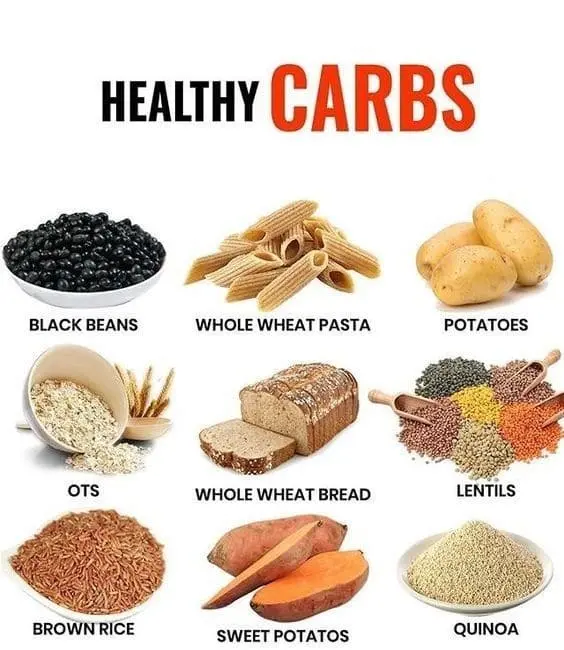What is Carbohydrate ? Uses | Definition,& Examples
Carbohydrates are essential nutrients that serve various crucial functions in the body. They provide energy for daily activities, fuel for the brain, and play a vital role in cell structure. Understanding Carbohydrates uses is key to maintaining a balanced diet and overall health.
What is Carbohydrate ?
Carbohydrates, often referred to as carbs, are one of the three primary macronutrients in our diet, alongside proteins and fats. They serve as a crucial source of energy for the body, fueling various physiological processes and activities. Carbohydrates come in various forms, including sugars, starches, and fibers, each with its unique role in our nutrition. Understanding the different types of carbohydrates and their impact on our health is essential for maintaining a balanced diet and overall well-being.

Carbohydrates uses
Carbohydrates are a vital nutrient with various uses in the body. It serves as the primary source of energy for daily activities, fueling the brain and muscles. Additionally, carbohydrates play a crucial role in cell structure and serve as a dietary source of fiber, aiding in digestion and overall health. Understanding the multifaceted Carbohydrates uses of carbohydrates is essential for maintaining a balanced diet and supporting overall well-being.

Energy Source:
When consumed, they are converted into glucose, which fuels cells, tissues, and organs, providing the energy needed for daily activities and bodily functions.
Brain Function:
It fuels cognitive processes, concentration, and mental alertness.
Physical Performance:
For athletes and individuals engaged in physical activities, carbohydrates are crucial for optimizing endurance and performance. They provide the energy required for strenuous exercise.
Spares Protein:
Adequate carbohydrate intake spares dietary protein from being used for energy, allowing it to fulfill its primary role in tissue repair and growth.
Prevents Ketosis:
Carbohydrates prevent the body from entering a state of ketosis, which occurs when there is a shortage of carbohydrates for energy. Ketosis can have adverse effects on health if prolonged.
Glycogen Storage:
Excess glucose from carbohydrates is stored as glycogen in the muscles and liver. This glycogen serves as a readily available energy reserve for times when dietary carbohydrates are insufficient.
Supports Metabolism:
Carbohydrates play a role in the metabolism of fats. Without adequate carbohydrates, fat metabolism can be impaired, leading to the incomplete breakdown of fats and the production of ketones.
Carbohydrates: Health Benefits
Carbohydrates offer several health benefits when incorporated into a balanced diet:

Energy:
Carbohydrates are the body’s primary source of energy. They provide the fuel necessary for daily activities, exercise, and bodily functions. A diet with sufficient carbohydrates helps maintain energy levels throughout the day.
Brain Function:
Glucose, derived from carbohydrates, is essential for proper brain function. It supports cognitive processes, concentration, and mental alertness. Including carbohydrates in your diet can enhance cognitive performance.
Digestive Health:
Carbohydrates, especially those rich in dietary fiber, promote healthy digestion. Fiber adds bulk to stools, preventing constipation, and supports regular bowel movements. It also aids in preventing digestive disorders like diverticulitis.
Weight Management:
High-fiber carbohydrates can contribute to weight management by promoting a feeling of fullness. This can lead to reduced overall calorie intake, making it easier to maintain or achieve a healthy weight.
Heart Health:
Consuming complex carbohydrates from sources like whole grains, legumes, and vegetables can help reduce the risk of heart disease. They are low in saturated fats and can lower levels of harmful LDL cholesterol.
Blood sugar Regulation:
Fiber-rich carbohydrates help regulate blood sugar levels by slowing the absorption of sugar into the bloodstream.
Nutrient Intake:
Carbohydrate-rich foods often contain essential vitamins, minerals, and phytonutrients. For example, fruits and vegetables are rich in vitamins and antioxidants, which contribute to overall health.
Exercise Performance:
Carbohydrates are vital for athletes and individuals engaged in physical activities. They provide the necessary energy to improve endurance, stamina, and performance during exercise.
Mood and Well-Being:
Carbohydrates can have a positive impact on mood. They stimulate the production of serotonin, a neurotransmitter associated with feelings of happiness and well-being.
Preventing Ketosis:
Adequate carbohydrate intake prevents the body from entering a state of ketosis, which can have adverse effects on health if prolonged. Ketosis occurs when there is a shortage of carbohydrates for energy.
Incorporating a variety of carbohydrates, especially those from whole and unprocessed sources, into your diet can contribute to overall health and well-being. Balancing carbohydrate intake with other nutrients is essential for reaping these health benefits while maintaining a healthy lifestyle.
Carbohydrates Classification
Carbohydrates are classified into different groups based on their chemical structure and complexity. The main categories include simple sugars (monosaccharides and disaccharides) and complex carbohydrates (polysaccharides). Understanding this classification is key to grasping the diverse roles that carbohydrates play in our diet and physiology. we take help from Wikipedia.org

Carbohydrates: Nutrition and Risks
Nutrition:
Types of Carbohydrates:
Carbohydrates are classified into two main types:
Simple Carbohydrates:
These include sugars like glucose, fructose, and sucrose, found in fruits, honey, and processed foods.
Complex Carbohydrates: Complex carbs are starches and dietary fiber found in foods like grains, legumes, vegetables, and whole fruits.
Dietary Fiber:
Fiber is a type of carbohydrate that is not fully digested by the body. It is crucial for digestive health and can be found in foods like whole grains, beans, nuts, and fruits.
Energy Source:
Carbohydrates are a primary source of energy, providing four calories per gram. They are the body’s preferred energy source for various functions, from daily activities to exercise.
Recommended Intake:
Dietary guidelines often recommend that carbohydrates make up about 45-65% of daily caloric intake, with an emphasis on complex carbs and fiber-rich foods.
Nutrient-Rich Sources:
Healthy sources of carbohydrates include whole grains (such as brown rice and oats), legumes (like lentils and chickpeas), fruits, vegetables, and nuts.
Risks:
Overconsumption:
Excessive carbohydrate intake, especially from sugary and processed foods, can lead to weight gain, obesity, and an increased risk of chronic diseases like type 2 diabetes and heart disease.
Blood Sugar Spikes:
Refined carbohydrates, such as white bread, sugary snacks, and sugary beverages, can cause rapid spikes and crashes in blood sugar levels, leading to energy fluctuations and increased hunger.
Empty Calories:
Some carbohydrate-rich foods, like sugary cereals and pastries, provide “empty” calories, meaning they lack essential nutrients and can contribute to nutrient deficiencies when consumed in excess.
Dental Health:
High-sugar foods and drinks can increase the risk of dental cavities and gum disease when not properly managed.
Processed Foods:
Many processed and fast foods are high in refined carbohydrates, contributing to poor dietary quality and an increased risk of health issues.
Insulin Resistance:
Consistently high carbohydrate consumption, especially when combined with a sedentary lifestyle, can lead to insulin resistance, a precursor to type 2 diabetes.
Individual Variations:
Some people may be more sensitive to blood sugar fluctuations and may need to monitor their carbohydrate intake more closely.
Conclusion
Carbohydrates are a vital nutrient that provides energy and essential fiber for our bodies. However, the quality and quantity of carbohydrate consumption matter. A balanced diet emphasizing complex carbohydrates and whole foods | fruits while minimizing sugary and processed items can help maintain good health and reduce the risks associated with excessive carbohydrate intake.








2 Comments